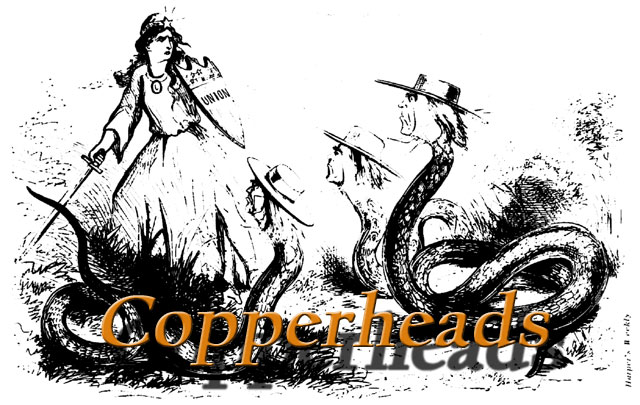Boston's New Labor Blog filled with economic royalists and serfs. A guide to complete sub-minimum wage employment in the new economy. Please support the blog by shopping for products on the right hand column.
Sunday, October 28, 2012
Clement Larid Vallandigham: one of the first bi-partisan northerners. A copperhead who supported the south against the north during the Civil War
Born in New Lisbon, Ohio, 29 July 1820, Vallandigham studied at the New Lisbon Academy, attended Jefferson College in Pennsylvania in 1 837 afid 1840, taught at a Maryland school in the intervening period, then privately pursued legal studies in Ohio, passing the state bar in 1842. A noted New Lisbon attorney, he won election to the state house of representatives in 1845 and 1846, moved to Dayton in 1847, bought a half-interest in the Dayton Empire, edited it until 1849, and was the defeated Democratic candidate in the 1852 and 1854 congressional elections. A candidate again in 1856, he contested his third defeat and won his seat in the U.S. House May 1 858. Narrowly reelected that autumn, Vallandigham made a national reputation as a conservative and as a contentious states-rights advocate. He became brigadier general of Ohio militia in 1857, met with the captured abolitionist John Brown in 1859, subsequently spread rumors of a national abolitionist conspiracy, then supported a moderate course in the secession crisis, backing Democratic presidential candidate Stephen A. Douglas in 1860.
Vallandigham opposed the Federal government's prosecution of the Civil War, publishing a letter in the 20 Apr. 1861 Cincinnati Daily Enquirer stating his belief that the South could not be coerced into reentering the Union. Supported by vocal immigrant and farm constituencies in Ohio, he blamed the war on Pres. Abraham Lincoln and the Republican Party, voted against national Conscription, refused to cooperate with congressional war measures, and alienated the powers within his own political party. A Copperhead, falsely believed to belong to the Knights Of The Golden Circle, he was abandoned by the state's War Democrats in a fight to keep his original congressional district intact. It was gerrymandered to contain a minority of his supporters, and he was not reelected in 1 862. Determined to run for the governorship in 1863, he began an unofficial campaign in spring 1862, following Democratic victories in Dayton, and tried to rally support for his candidacy over that of Democratic elder-statesman Hugh J. Jewett. The preliminary Ohio Democratic convention met 28 Apr. and rejected Vallandigham's bid for the gubernatorial nomination.
On 13 Apr. 1863, Maj. Gen. Ambrose E. Burnside, Commmander of the Department Of The Ohio, had issued General Order No. 38, forbidding expression of sympathy for the enemy. On 30 Apr. Vallandigham addressed a large audience in Columbus, made derogatory references to the president and the war effort, then hoped that he would be arrested under Burnside's order, thus gaining popular sympathy. Arrested at his home at 2 a.m., 5 May, by a company of troops, he was taken to Burnside's Cincinnati headquarters, tried by a military court 6-7 May, denied a writ of habeas corpus, and sentenced to 2 years' confinement in a military prison. Following a 19 May cabinet meeting, President Lincoln commuted Vallandigham's sentence to banishment to the Confederacy. On 26 May the Ohioan was taken to Confederates south of Murfreesboro, Tenn., and there entered Southern lines. Outraged at his treatment, by a vote of 411 -11 state Democrats nominated Vallandigham for governor at their 11 June convention.
Vallandigham was escorted to Wilmington, N.C., and shipped out to, Bermuda, arriving there 1 7 June. He traveled to Canada, arrived at Niagara Falls, Ontario, 5 July, and from there and Windsor, Ontario, conducted his campaign for the governorship. Candidate for lieutenant governor George Pugh represented Vallandigham's views at rallies and in the press. Lincoln interested himself in the election, endorsed Republican candidate John Brough, downplayed the illegalities of a civilian's arrest and trial by military authorities, and claimed that a vote for the Democratic contender was "a discredit to the country." In the election of 13 Oct. 1863, Brough defeated Vallandigham 288,000 - 187,000.
With the election crisis passed, Lincoln and the military ignored Vallandigham's return to the U.S, in disguise 14 June 1864. Here established residence in 0hio, attended the August national Democratic convention in Chicago, and helped construct the disastrous "peace" plank in presidential candidate George B. McClellan's platform.
In postwar years the Democratic party declared him persona non grata at its 1866 Philadelphia convention, a meeting of old Federals and recently reconstructed Southern Democrats, where it was felt his presence was disruptive. After he lost a bid in 1867 for election to the state senate, he resumed his law practice. In a Lebanon, Ohio, hotel, 16 June 1871, a gun went off while he was demonstrating to other attorneys how a defendant's supposed victim may have accidentally shot himself. He died there the following day.
The Ohioan is best remembered for the Feb. 1864 Supreme Court decision, Ex Parte Vallandigham, which decreed that the Court could not issue a writ of habeas corpus in a military case, and for a Democratic campaign slogan he created May 1862: "The Constitution as it is, the Union as it was." Inspired by the story of Vallandigham's banishment and his remark at that time that he did not care to live in a country where Lincoln was president, Edward Everett Hale wrote "The Man Without a Country" (1863).
Originally posted here: http://www.civilwarhome.com/vallandighambio.htm
Subscribe to:
Post Comments (Atom)


No comments:
Post a Comment